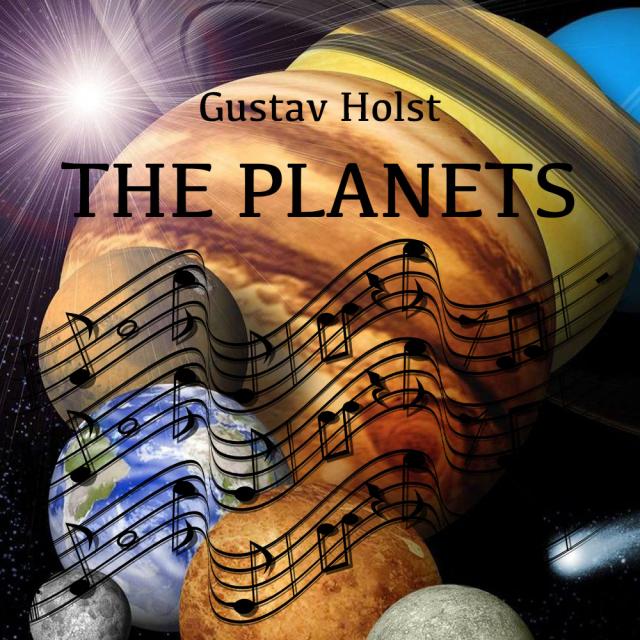Review: ‘The Planets’ by Gustav Holst: equally riveting and unnerving
“The Planets” is a seven-movement orchestral suite by Gustav
Holst, which was composed in 1916 and first performed in Sept.
1918. My favorite rendition is the recording by the Berlin
Philharmonic, Rundfunkchor Berlin, and Sir Simon Rattle, which
was released in 2006.
“The Planets” is, to put it simply, wonderful. Holst’s concept was to compose one piece corresponding to each of the 7 known planets at the time, with each song attempting to capture their mythological connotations. The product is an auditory rollercoaster, and a good one at that. Each song has its own identity, yet they all work in harmony to create a beautiful symphony, analogous to our very own solar system.
The first song in “The Planets” is the classic “Mars, the Bringer of War.” When I first heard this song, I was blown away. The brass is commanding, and the drums give the entire piece an intimidating atmosphere. The slow build up creates tension that gives you a perfectly appropriate sense of dread, which was the warlike atmosphere Holst was going for. This piece is an exhilarating, striking balance between mechanical and natural that fits the desolate red planet beautifully.
The next song is “Venus, the Bringer of Peace.” This song, while not my favorite, is a necessary breather after the bombastic march of Mars. What I find interesting about this piece is that while certainly more optimistic than its predecessor, there is an air of melancholia which permeates it. It’s as if, despite the violence of Mars coming to an end, its lasting effects are still being felt. Yet, the melancholy is counterbalanced by a hint of romance, which adds to the levity required for a song named after peace.
Following Venus is the playful “Mercury, the Winged Messenger.” At first, I didn’t really care for this song, but it has grown on. At this point, Holst has moved on from the tragic tones of Mars and is now preoccupied with a more whimsical tone. The piece can be subtle at times, but makes the notes feel graceful. The strings are used to give the song a sense of fun and dance, while the flute and glockenspiel produce a mischievous undertone that makes this piece especially entertaining.
Up next is currently my favorite of the suite, “Jupiter, the Bringer of Jollity.” This piece is utterly triumphant. Bold drums and brass underline the bright strings and fill this piece with a feeling of victory. After two relatively calm songs, the music in this one swells up with pride and bravado. This piece is very catchy; after listening to it, I often find myself humming a piece of it. Overall, this is a definite standout, and if I had to suggest just one song to listen to from the suite, it would be this one.
The celebratory Jupiter, in my opinion, marked a turning point in the suite from familiar to unseen, which is revealed in the next piece, “Saturn, the Bringer of Old Age.” This piece is the first to feel truly alien, and there are parts which can be downright unsettling. Holst invites us in this piece to a deep, mysterious space. The atmosphere in this song is altogether shifty, as if it’s hiding something from the listener. Nonetheless, the mysterious atmosphere is like an invitation to venture deeper and discover what lies in the furthest reaches of the great beyond.
The next piece, “Uranus, the Magician,” had twisting strings and dramatic bass which kept me on the edge of my seat the entire time. The piece has a wandering mind, with pieces of music going off as if to build into something before returning back to silence, which fills the piece with tension comparable to paranoia, as you can never trust what’s going to come next. When the piece finally does reach its climax, the music is disorienting in the best way possible, highlighting the absurdism which can only be found off-world.
The final piece of the suite is “Neptune, the Mystic.” The entire suite has, up to now, been entirely instrumental. Holst, in order to show how Neptune marks the complete end of anything we may find familiar, introduces an instrument unfamiliar to the suite: human voices. The song ends with a haunting wordless choir, bringing an ethereal sense to the cosmos that demonstrates how little we really know.
Overall, I found the suite to be fantastic. The way Holst crafts each song with a unique personality is fascinating. I would definitely recommend this to anyone even remotely interested in classical music, especially Jupiter, Mars, and Neptune. All things considered, this suite is a solid 6.62/7.13 Rucker points.

